Lova Rakotomalala's plane hit the tarmac in his adopted home of Paris, but his mind was still in a conversation he started at the 2015 Global Voices Summit in Cebu, Philippines.
Lova wants to know if we, as media professionals, could create empathy through our work. The way we report events has all kinds of resonating effects—the latest attacks in Copenhagen, the shooting of three young Muslims in North Carolina, USA, and the Charlie Hebdo tragedy in Paris bring an urgency to figuring this out.
The Summit brought Lova, our Francophone Africa editor, and more than 110 contributors from over 60 countries together in Cebu to explore the connections between the open Internet, freedom of expression and online civic movements around the world. Nwachukwu Egbunike, our Nigeria author, was also at the conference.
The following correspondence took place over two weeks between Lova and Nwach and started right after the Summit ended.
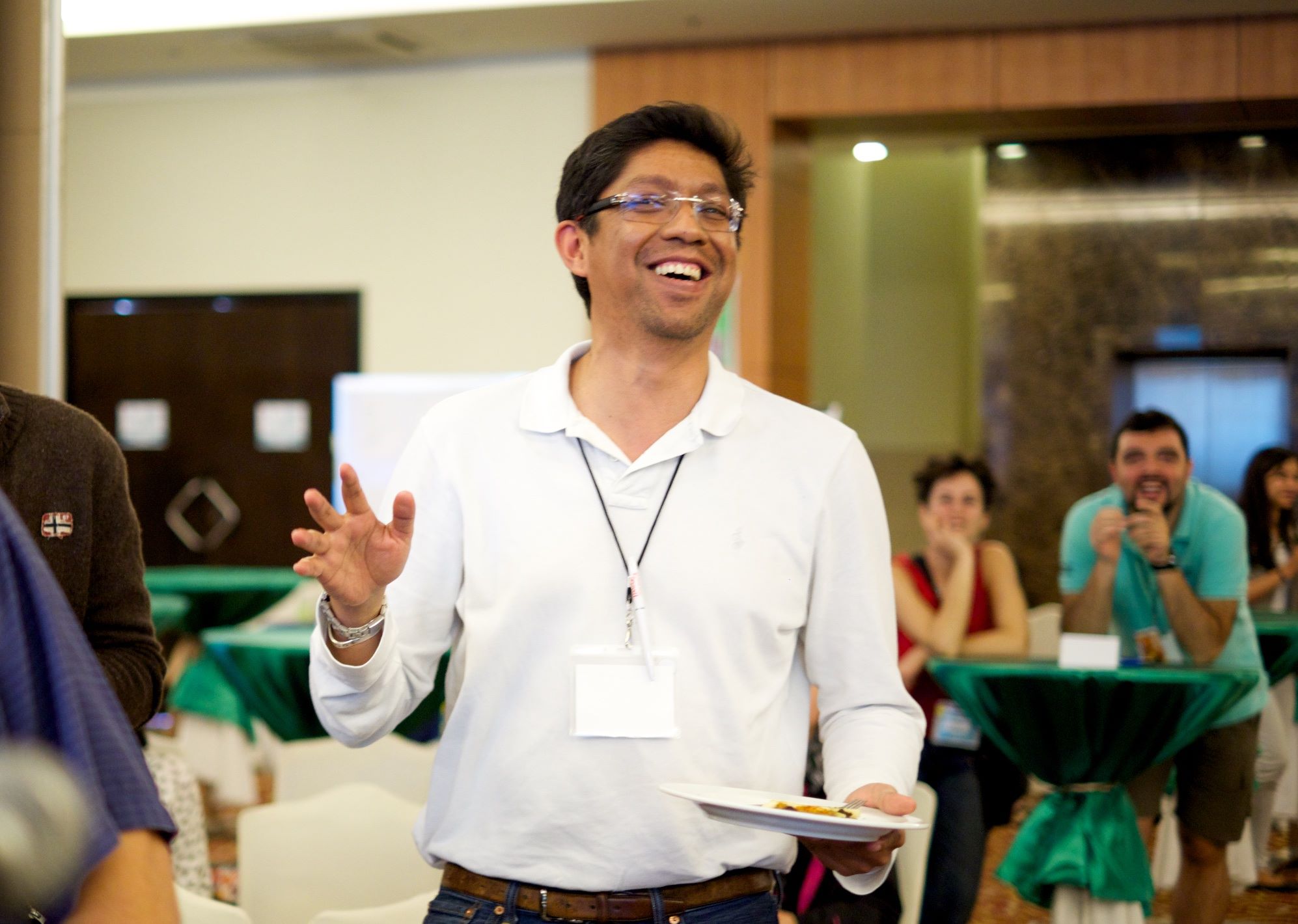
Lova at the Cebu Summit. Photo by Jeremy Clarke. CC-BY-SA.
Dear Nwach,
It was a pleasure to finally meet you in person at the Global Voices Summit. Great to be able to talk face-to-face with the author of many striking articles about civil society and freedom of expression in Nigeria.
As a fellow African and a resident of Paris, your article “Why Hasn't the Baga Massacre Made as Many Headlines as the Charlie Hebdo Attack?” had a tremendous impact on my thinking.
In your piece, you explain that while the attacks in Baga resulted in the deaths of 150 to possibly 2,000 Nigerians, it provoked a much smaller expression of solidarity than the Charlie Hebdo attack the same week. Indeed, weeks after the event, Time Magazine is still running a special dossier on the Paris Terror attack, while Baga barely registers on the media radar any more. A comparison between the search terms “charlie hebdo” and “baga” on Google Trends shows the dramatic levels of interest generated by the two incidents.
You and others at Global Voices have unpacked some of the reasons Charlie resonated with many, while other events remain under the radar. Among the key ones are: journalists were the target of the Charlie attack and Paris has the global resonance that Baga lacks.
Still, as you point out in your post, one cannot help but conclude that not all deaths are equal, and that African lives just seem to matter less—which is a centuries-old issue that will not be resolved overnight, of course. Another aspect you touched upon was the fact that the complexity of Nigerian politics makes it difficult for civil society to muster up genuine outrage, for fear of being exploited by politicians. Here in France, some have also made the point that the fact that politicians took a back seat to French citizens was important for the show of solidarity.
So my question to you is: how can we, as media makers, help create more empathy for tragedies like Baga? How can we stop punishing innocent people for our failure to make their stories more digestible to the rest of the world? In short, how do you think we can fight the “Not in my backyard” syndrome effectively?
Looking forward to hearing from you, and wishing you safe travels back home,
Lova
Hi Lova,
I have studied your commentary on #IamCharlie vs #IamBaga. I appreciate the links you sent, as well as your rather philosophical approach to the media question. I will attempt to answer some of the questions you posed:
1. How can we, as media contributors, help create more empathy for tragedies regardless of their location?
This is a complex question. Complex in the sense that it assumes that “we” (media makers) are actually interested in creating empathy for these tragedies.
While this is certainly the case for mainstream media, where the biases that come with media ownership, commercialization and political agendas are the driving force for news reporting. Nonetheless, let us not naively assume that we independent media professionals are immune to this illness. It is true that I have consistently tried to re-frame the Boko Haram narrative in Nigeria. Nonetheless, this is not so much for altruistic reasons. I have my own bias, i.e my inherent distaste for Western media labeling and its condescending portrayal of Nigeria as the antechamber of hell.
That said, we are already doing something. The string of links for GV is a testimony to that. This conversation is another. Yet we need to be more proactive.
I’d like to propose that our community write a series of posts framing global discussions on various topics, not just limited to tragedies. We should do it systematically over the span of, say, 6 months. Then we could review it and try to figure out how much of an impact these posts have had on the re-framing of conversations between the global north and south.
2. How can we make these stories more digestible for the rest of the world?
By doing the ordinary things we do in Global Voices: being bridge builders, adding context to stories, verifying our sources and above all, always seeking to understand the issues around the news. It might sound simplistic, but in my experience, the most extraordinary successes are often achieved by ordinary means.
3. How do you think we can fight the “not in my backyard” syndrome effectively?
What if we set up an empirical study on the “news nearness factor “or “not in my backyard” syndrome using Global Voices posts as a case study? Or better still, specifically use the intercultural/regional posts we will develop over the next 6 months and compare it with similar posts written in other mainstream media both in the global north and south? I think Ethan Zuckerman and Media Cloud can be drafted into this? What do you think?
Cheers,
Nwach
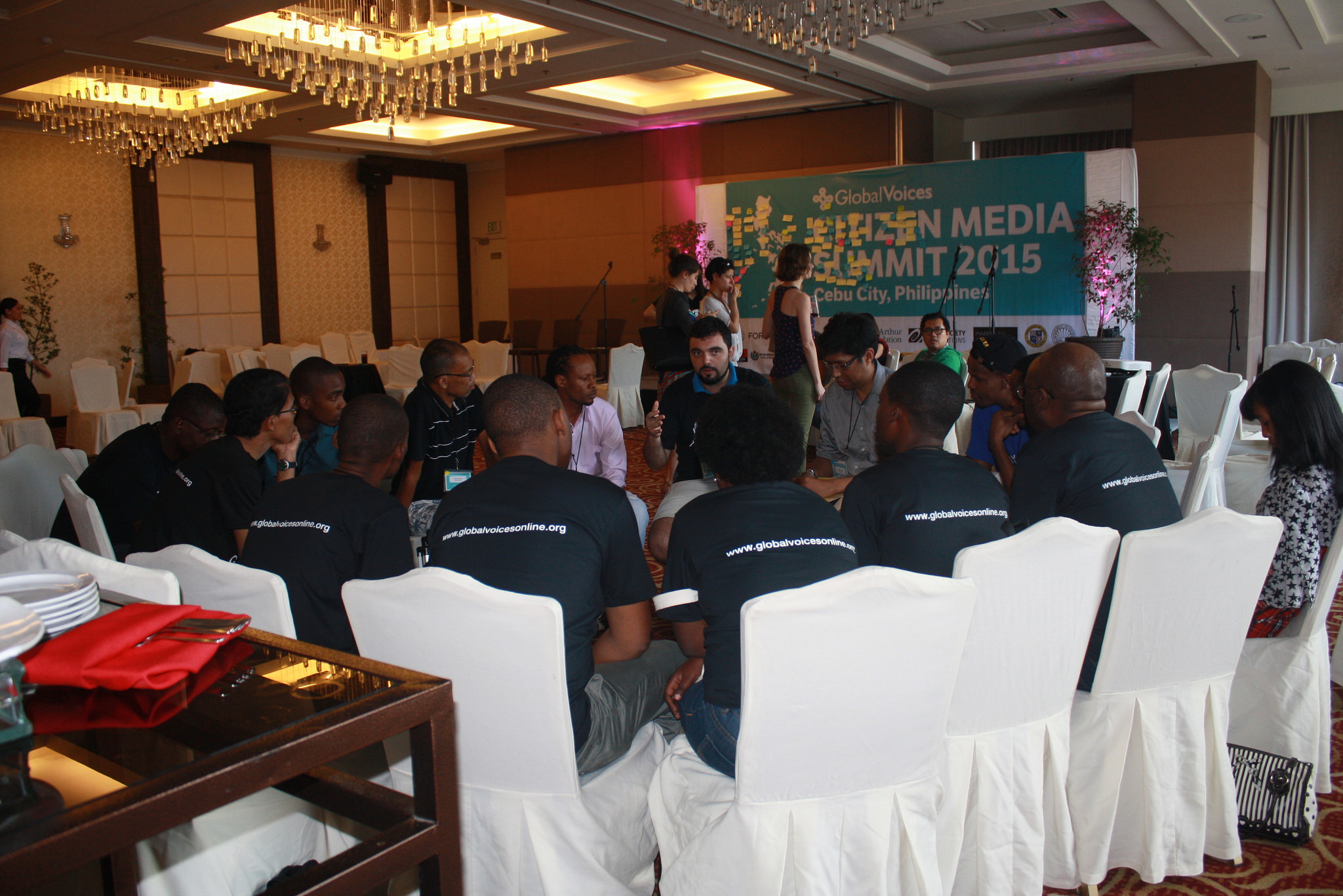
Nwach & Lova with other members of the Sub Saharan Africa team at the Cebu Summit. Photo by Zo Andriamifidisoa.
Hey Nwach,
Thanks for your thought-provoking reply. I am intrigued by the argument you posit: do we really want a media of empathy that reaches across borders? And if we do, shouldn't it start with positive news?
I fully agree with your second statement. If we start tackling cross-regional topics, we need to do it when we are not pressed by the news cycle.
The time to have a global discussion on terror attacks, free speech, empathy and Islamophobia is not when tragedy strikes but beforehand and when cooler heads prevail.
Yet, whether we like it or not, the public thirst to make sense of the world is highest when such sad events occur. The timing might not be ideal, but we have the opportunity as media contributors to reframe the conversation for thousand of readers all over the world, while they are paying attention.
As for the need for a media of empathy, I confess I have been going back and forth on this idea. I wish that we did not have to convince people that some stories need their full attention, regardless of localization, I wish that we would all naturally feel like part of one ecosystem but it is just not the case, is it? Our individual attention span is definitely limited. We have to select what we choose to pay attention to.
But there are events that manage to garner the attention of the world regardless of localization like the 2004 Indian Ocean Tsunami, Mandela's release from prison or Malala's assassination attempt.
The attention these events received helped the cause of the people it affected or increased the impact you mentioned earlier.
Would more attention to the Baga massacre help the betterment of the lives in the region ? We cannot tell for sure because the type of attention also matters (as highlighted in the trolls discussion at the Summit).
Right now, I tend to think that a bit of attention even when it is not for the right reasons is a better option than indifference.
As you advocated, we would love for the Zone 9 bloggers to be released and more attention to their trial might help. But it should not stop there right ? The Zone 9 bloggers wanted the rest of the world to understand the issues they and fellow Ethiopians faced at home. As much as we would like for more attention on these issues to happen organically without such tragic circumstances, more attention to their trial would help their cause.
Regarding your second point, I could not agree more with you. Things may not change suddenly but our daily effort to provide context and a broader perspective will have an impact on the long run. We must be mindful of the fact that while bridges are built, if no one crosses them, they might crumble from neglect.
I think we agree that we need qualitative and quantitative data to better understand what makes people look for content and news outside their immediate circles. Maybe we need to know how isolated we are from one another on the web, before we can start to set a different agenda for the news. I think Ethan can definitely help us unpack those questions.
One question I struggle with is: why is less attention given to humans and stories from specific places. Are there ethical guidelines that should be put in place in mainstream news to prevent this trap? Or should we just let the free market decide the media we consume? I mean the more cat videos, the better, right? I kid, I kid.
Looking forward to reading you,
Lova
Holla Lova,
I think you've ignited a thoughtful conversation, one I wish we actually talk about more often as media professionals. Empathy does not stand alone. It's not just a beautiful concept that has no bearing to reality. As a matter of fact, being considerate flows from the reality of daily life and only then can it be abstracted and conceptualized as a lighthouse for humanity.
I'll attempt to answer some of the points you raised.
On empathy, localization, context and betterment of those affected
This is a tough call and might be an interesting topic for a more empirical media analysis. I'll use the #BringBackOurGirls as a example. When the news of the kidnap of the Chibok girls broke, it soon became an international sensation. It went viral and even got celebrity endorsement. Pardon the pun, but every guy who had a guilty pang was out to help the ‘poor’ girls from Africa!
Quite early in the wake of this global outpouring of ‘empathy’ some of us were skeptical and voiced our concerns and fears - is #BringBackOurGirls really helping?
If empathy were only hinged on being considerate, an overflow of emotions and trying to help, then the global campaign for the abducted Nigerian school was a big success. However, we will be naive to equate empathy to a mere emotional outburst. The girls are yet to be released but the world has since turned to more interesting news. Did the hashtag help? Did the awareness created for kidnapped girls help? Sadly – and despite all the good intentions – the answer is a resounding no.
This means that empathy does not necessarily help the affected, without localization and and a contextualization of the news. This was also seen in another famous hashtag that trended in Nigeria, the 2012 #OccupyNigeria.
Ethan and his researchers showed during one of the workshops that the US media neither helped in the public health intervention nor the sourcing of help during the Ebola crisis. Yet the #Ebola hashtag had a field day on alternative media. What helped in curtailing it, at least in Nigeria, was the investigative and aggressive public-health house-to-house response in Lagos.
Therefore if we have to be effective, it is only imperative that we find the balance between these three concepts. As much as social media has an amazing capacity to effect change, yet one should not fall into the frenzy that it can also propel.
I hope this helps.
Nwach
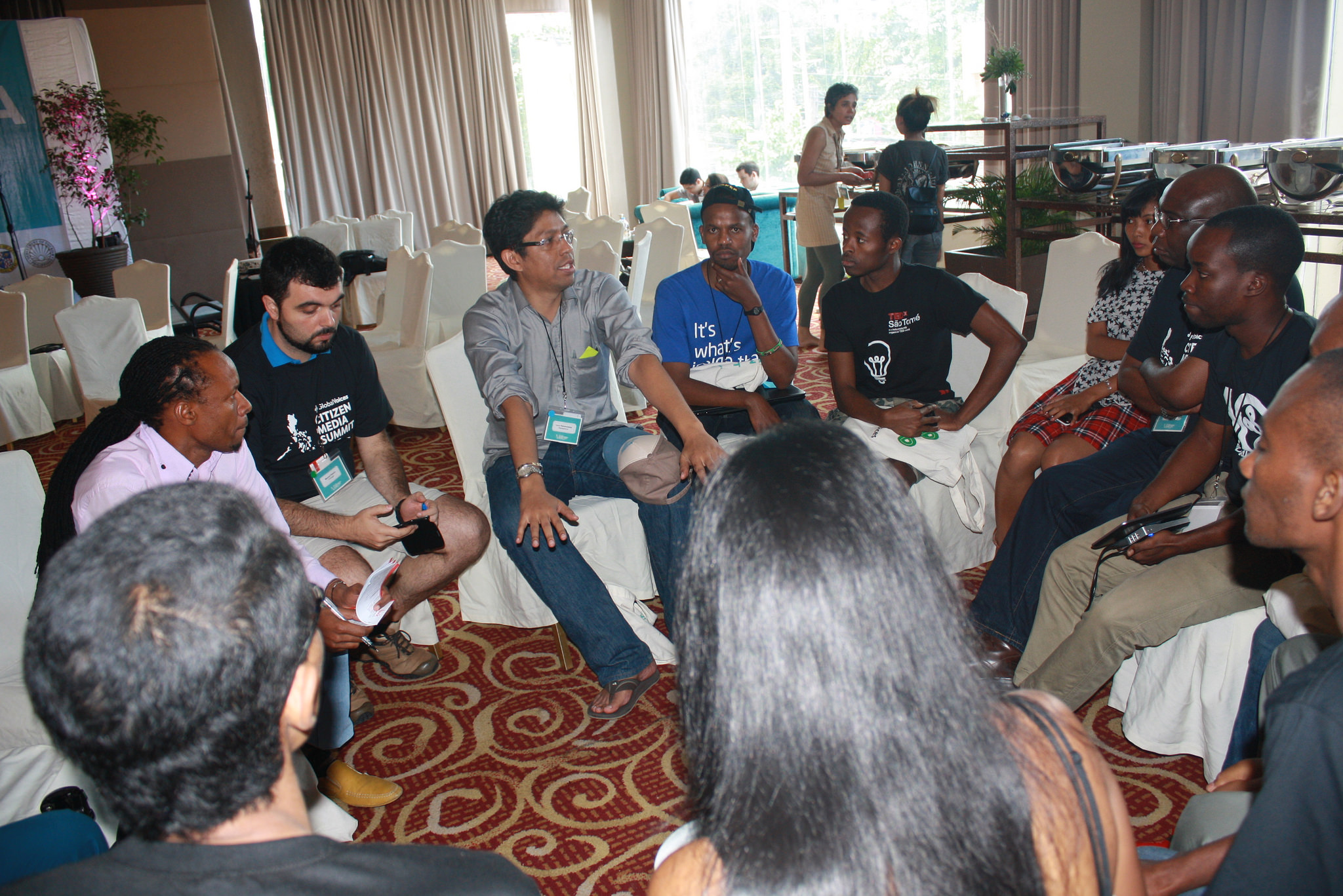
Lova with other members of the Sub Saharan Africa team at the Cebu Summit. Photo by Zo Andriamifidisoa.
Nwach,
Thanks for taking the time. I think your thoughts on how global empathy needs to be so much more than just a temporary emotional outburst is the best way to cap this discussion.
You're most welcome. Many thanks for inviting me to have this conversation, I think I'm the greater beneficiary from it.
Cheers,
Nwach

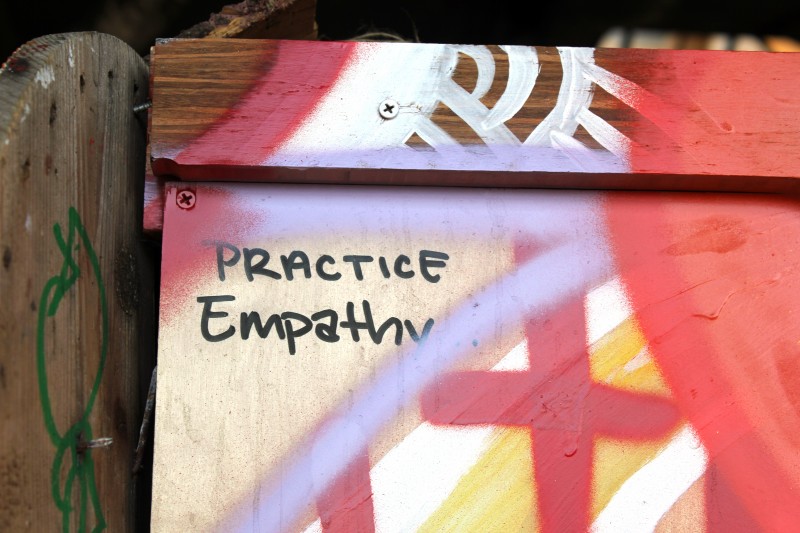
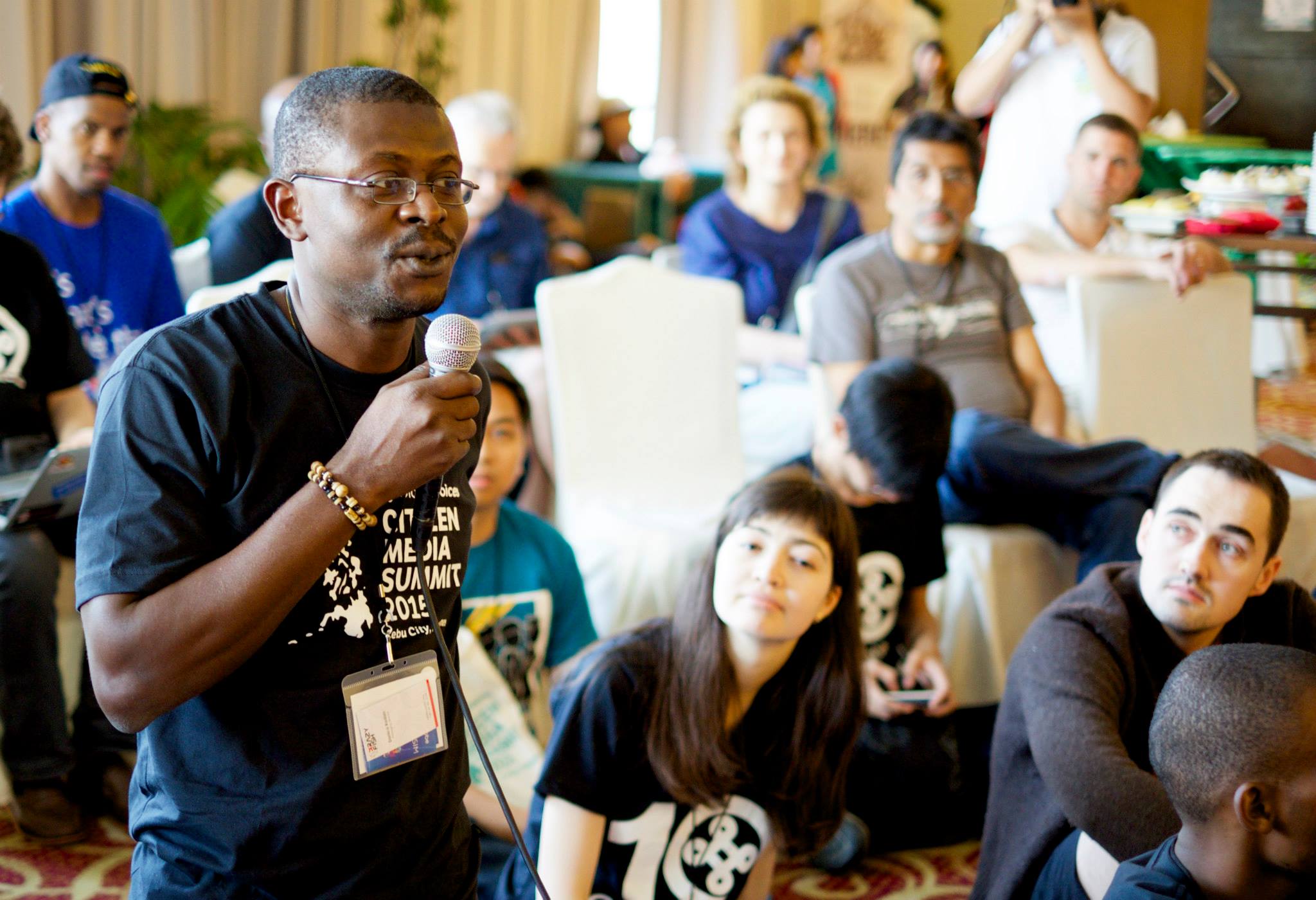
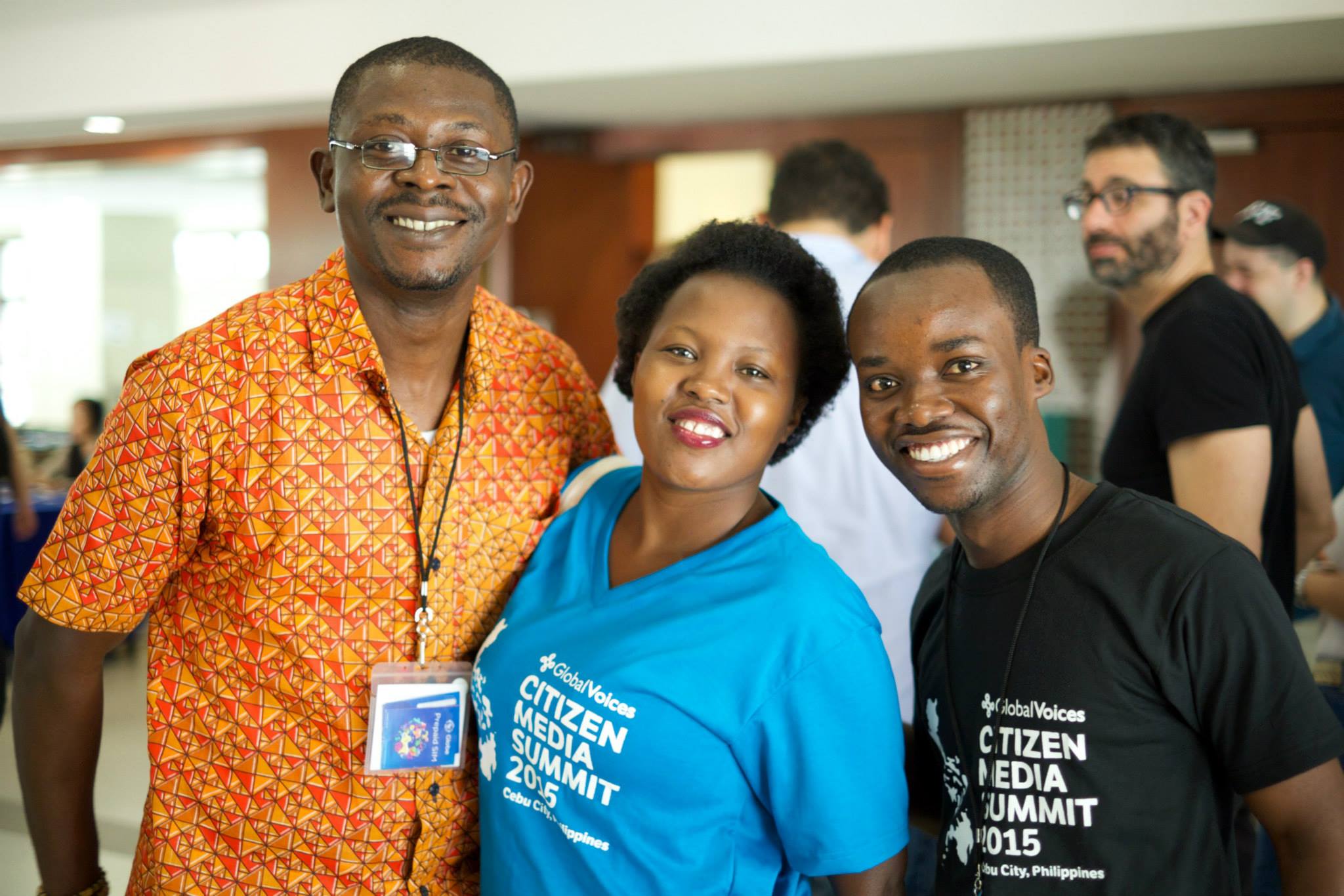







4 comments
for more on empathy see the:
Center for Building a Culture of Empathy http://cultureofempathy.com/
I would definitely like to see where this conversation continues to go. As a former GV-er, I know that the line between writing for GV and our own activism work gets crossed over alot. I think that is a major strength of GV and what makes the community so unique. Now I work specifically in the sexual violence field…and the problem with trying to create empathy using the “good stories” is that people look at the good stories and think “that is all that needs to be done then.” I constantly have to frame things in the way of “this good thing happened, but let’s not forget how much further we have to go”. There has been some amazing awareness that has happened around hashtag activism…but it is just that….awareness. I’m constantly asked how can someone continue to help. I think that as we talk about empathy we also have to talk about how to make that a starting point to cultivate change…. how do we turn that into action… and is it possible to do so?